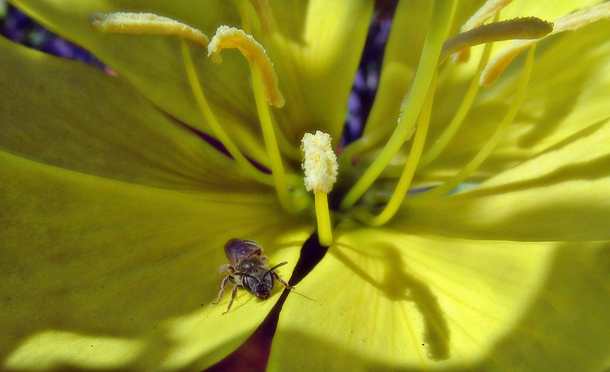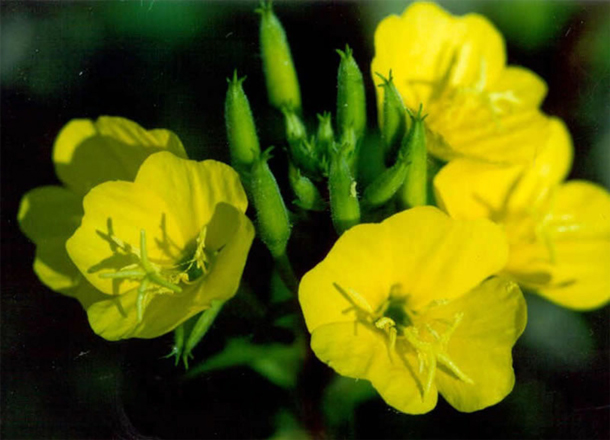Science Note: Can Plants Hear?
Air Date: Week of August 6, 2021

Researchers observed that when evening primrose was exposed to the sound of a flying bee, or similar (but synthetic) sound-signals, the flowers began to excrete sweeter nectar within three minutes. (Photo: TJ Gehling, Flickr, CC BY-NC-ND 2.0)
Flowers don’t have ears like ours, but research has found that some flowers, like evening primrose, can “hear” the buzzing of bees’ wings. Living on Earth’s Don Lyman reports on how these flowers sometimes quickly respond to nearby pollinators by sweetening their nectar.
Transcript
CURWOOD: Coming up after the break, protecting human health by protecting planetary health but first this Note on Emerging Science from Don Lyman.
[SCIENCE NOTE THEME]
[SFX BUZZING OF A BEE]
LYMAN: Humans can hear the gentle buzzing of a honey bee with our ears of course, but it turns out that some flowers can also hear the sound of their favorite pollinators. Well, kind of…researchers at Tel Aviv University recently found that the concentration of sugar in the nectar of evening primrose temporarily increased within minutes of sensing vibrations from pollinators’ wings. The researchers suspect the flowers act like ears, and can pick up the specific frequencies of bees’ wings, but are able to tune out background noise, like wind.
To test their hypothesis, scientists exposed plants in the lab to five sound treatments: silence, recordings of a honeybee from four inches away, and computer generated sounds in low, intermediate and high frequencies.
Plants under sound proof glass jars – the silence group – as well as plants in the intermediate and high frequency groups,
[SFX]
had no significant increase in sugar concentration in their nectar.
But plants exposed to recordings of bee sounds
[BUZZING]
and similar low-frequency sounds
[LOW FREQUENCY SOUND]
produced as much as 65 percent more sugar in their nectar within three minutes of exposure to the recordings.
The researchers believe that sweeter nectar may attract more pollinators and increase the chance that bee detecting evening primrose will cross-pollinate with other plants and pass on their bee hearing genes.

Evening primrose and other plants “hear” due to how their petals vibrate when sound waves pass them by. (Photo: U.S. Forest Service, Flickr, CC BY 2.0)
The researchers also conducted experiments that showed that the bowl-shaped flowers of the primrose picked up and amplified sound vibrations.
This single study has opened up a new field of scientific research, which the researchers call phytoacoustics.
That’s this week’s note on emerging science. I’m Don Lyman.
[SCIENCE NOTE THEME]
Links
Smithsonian Magazine | “Flowers Sweeten Up When They Sense Bees Buzzing”
Living on Earth wants to hear from you!
Living on Earth
62 Calef Highway, Suite 212
Lee, NH 03861
Telephone: 617-287-4121
E-mail: comments@loe.org
Newsletter [Click here]
Donate to Living on Earth!
Living on Earth is an independent media program and relies entirely on contributions from listeners and institutions supporting public service. Please donate now to preserve an independent environmental voice.
NewsletterLiving on Earth offers a weekly delivery of the show's rundown to your mailbox. Sign up for our newsletter today!
 Sailors For The Sea: Be the change you want to sea.
Sailors For The Sea: Be the change you want to sea.
 The Grantham Foundation for the Protection of the Environment: Committed to protecting and improving the health of the global environment.
The Grantham Foundation for the Protection of the Environment: Committed to protecting and improving the health of the global environment.
 Contribute to Living on Earth and receive, as our gift to you, an archival print of one of Mark Seth Lender's extraordinary wildlife photographs. Follow the link to see Mark's current collection of photographs.
Contribute to Living on Earth and receive, as our gift to you, an archival print of one of Mark Seth Lender's extraordinary wildlife photographs. Follow the link to see Mark's current collection of photographs.
 Buy a signed copy of Mark Seth Lender's book Smeagull the Seagull & support Living on Earth
Buy a signed copy of Mark Seth Lender's book Smeagull the Seagull & support Living on Earth

